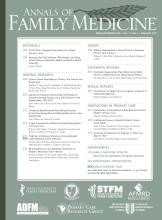Abstract
PURPOSE Eczema may flare because of bacterial infection, but evidence supporting antibiotic treatment is of low quality. We aimed to determine the effect of oral and topical antibiotics in addition to topical emollient and corticosteroids in children with clinically infected eczema.
METHODS We employed a 3-arm, blinded, randomized controlled trial in UK ambulatory care. Children with clinical, non-severely infected eczema were randomized to receive oral and topical placebos (control), oral antibiotic (flucloxacillin) and topical placebo, or topical antibiotic (fusidic acid) and oral placebo, for 1 week. We compared Patient Oriented Eczema Measure (POEM) scores at 2 weeks using analysis of covariance (ANCOVA).
RESULTS We randomized 113 children (40 to control, 36 to oral antibiotic, and 37 to topical antibiotic). Mean (SD) baseline Patient Oriented Eczema Measure scores were 13.4 (5.1) for the control group, 14.6 (5.3) for the oral antibiotic group, and 16.9 (5.5) for the topical antibiotic group. At baseline, 104 children (93%) had 1 or more of the following findings: weeping, crusting, pustules, or painful skin. Mean (SD) POEM scores at 2 weeks were 6.2 (6.0) for control, 8.3 (7.3) for the oral antibiotic group, and 9.3 (6.2) for the topical antibiotic group. Controlling for baseline POEM score, neither oral nor topical antibiotics produced a significant difference in mean (95% CI) POEM scores (1.5 [−1.4 to 4.4] and 1.5 [−1.6 to 4.5] respectively). There were no significant differences in adverse effects and no serious adverse events.
CONCLUSIONS We found rapid resolution in response to topical steroid and emollient treatment and ruled out a clinically meaningful benefit from the addition of either oral or topical antibiotics. Children seen in ambulatory care with mild clinically infected eczema do not need treatment with antibiotics.
- Received for publication July 13, 2016.
- Revision received October 26, 2016.
- Accepted for publication November 20, 2016.
- © 2017 Annals of Family Medicine, Inc.







